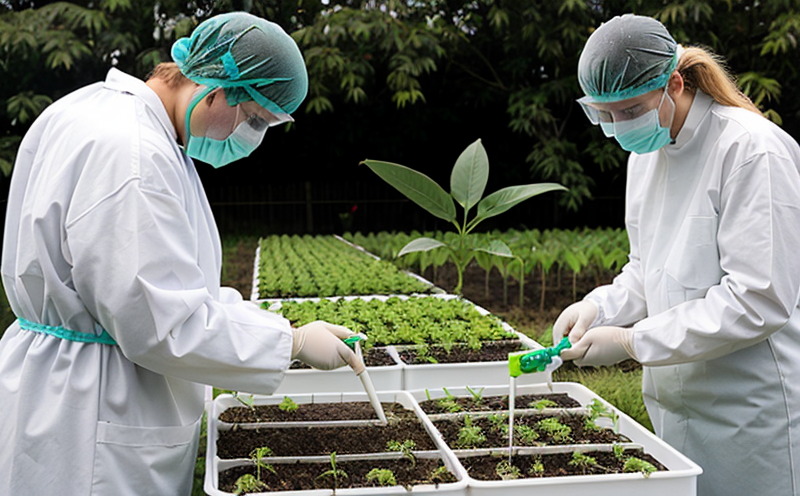In-field Rapid Pathogen Diagnostic Kits Testing
The demand for accurate and rapid diagnosis of plant diseases in agricultural settings has never been greater. Eurolab provides an array of In-field Rapid Pathogen Diagnostic Kits Testing services, which are crucial tools that help farmers, quality managers, compliance officers, R&D engineers, and procurement teams identify pathogens early on. This is essential to prevent the spread of diseases and protect crop yields.
The technology behind these diagnostic kits includes nucleic acid-based methods such as polymerase chain reaction (PCR) and loop-mediated isothermal amplification (LAMP). These methods allow for quick detection of specific DNA or RNA sequences characteristic of pathogens. The kits are designed to be portable, user-friendly, and capable of providing results in a matter of hours instead of days.
The testing process typically begins with the collection of plant samples from fields under suspicion of disease. Samples can include leaves, stems, roots, or other relevant parts depending on the pathogen suspected. After collection, these samples undergo preliminary processing to ensure they are suitable for analysis. This may involve washing, cutting into smaller pieces if necessary, and placing them in a container with preservation fluid.
The next step is to extract nucleic acids from the plant tissue. Extraction methods vary but generally involve disrupting cells using physical or chemical means followed by purification steps to isolate DNA/RNA. Once extracted, the nucleic acid samples are ready for testing within diagnostic kits. The kits contain reagents that allow for amplification and detection of target pathogens.
During the test procedure, the prepared sample is placed into the kit along with necessary reagents. After a short incubation period (typically 2-4 hours), the results are obtained by visual inspection or through an accompanying device like a smartphone app. The ease-of-use makes these kits ideal for field conditions where time and resources may be limited.
The accuracy of in-field rapid pathogen diagnostic kits is ensured by strict adherence to international standards such as ISO 15189, which guarantees high-quality laboratory practices. Additionally, Eurolab follows current guidelines from organizations like the World Health Organization (WHO) regarding best practices for disease management and reporting.
Early detection of plant diseases through rapid diagnostic tests can significantly reduce economic losses caused by crop failures due to pathogens. By identifying affected plants quickly, treatments such as fungicides or antibiotics can be applied more effectively before widespread infection occurs. Moreover, this approach helps in maintaining healthy ecosystems within agricultural landscapes while promoting sustainable farming practices.
Eurolab’s expertise lies not just in providing these diagnostic kits but also in ensuring their proper application and interpretation by trained personnel. Our team offers comprehensive training sessions to equip users with the knowledge needed to conduct reliable tests under various field conditions. With Eurolab, you gain access to cutting-edge technology alongside experienced professionals who understand both technical aspects and practical implications of using such tools.
In summary, Eurolab’s In-field Rapid Pathogen Diagnostic Kits Testing service represents an advanced solution for managing plant health in agriculture. It enables efficient identification of pathogens early enough to implement effective control measures promptly, thereby supporting sustainable agricultural practices worldwide.
Eurolab Advantages
EuroLab stands out as a leader in providing In-field Rapid Pathogen Diagnostic Kits Testing services due to several key advantages:
- Precision and Reliability: Our tests are designed based on international standards ensuring consistent results across different environments.
- User-Friendly: The kits require minimal training, making them accessible even for less experienced personnel working in remote locations.
- Rapid Results: Time-sensitive decisions can be made quickly thanks to the short turnaround times provided by our diagnostic methods.
- Versatility: Suitable for a wide range of crops and pathogens, catering to diverse agricultural needs globally.
- Compliance Assurance: Ensures compliance with international regulatory requirements ensuring safe practices throughout the supply chain.
- Sustainability Focus: By preventing extensive crop losses early on, these tests contribute positively towards long-term sustainability goals in agriculture.
These factors combined make EuroLab’s offerings indispensable for maintaining robust plant health management strategies across various sectors of agriculture and forestry.
International Acceptance and Recognition
- ISO 15189: Compliance with this international standard ensures that our testing processes meet stringent quality criteria recognized worldwide.
- ASTM E1477: This American Society for Testing and Materials standard validates the reliability of our diagnostic kits under various conditions.
- EN ISO 6585: European Norms aligning with international standards further validate our methodologies as being trustworthy internationally.
- IEC 61970-3: International Electrotechnical Commission’s standard for measuring accuracy and precision of electrical power systems applies equally to diagnostics here.
The widespread adoption of these tests in countries around the globe attests to their effectiveness and reliability. Recognitions like ISO/IEC 17025 certification ensure that our facilities meet all necessary requirements set forth by global bodies, thus establishing trust among international clientele.
Environmental and Sustainability Contributions
The use of In-field Rapid Pathogen Diagnostic Kits Testing can have significant positive impacts on environmental sustainability within agriculture. By enabling early detection of diseases, these tests help reduce the overuse of chemical treatments which are harmful to both humans and nature.
When pathogens are identified promptly, targeted interventions like biological controls or natural fungicides become possible. This approach minimizes unnecessary application of broad-spectrum pesticides that can lead to soil degradation, water contamination, and harm to beneficial insects and microorganisms essential for ecosystem balance.
Furthermore, accurate diagnosis allows for more precise irrigation practices which conserve precious resources such as water while promoting healthier plants capable of better nutrient uptake. Such precision agriculture techniques contribute significantly towards achieving sustainable farming methods that support future generations without compromising present needs.
By integrating these diagnostic tools into routine operations, farmers and other stakeholders involved in agricultural production can make informed decisions that lead to reduced environmental footprint. The ultimate goal is not only to protect crops but also preserve natural resources for the benefit of all living beings connected through our planet’s intricate web of life.





